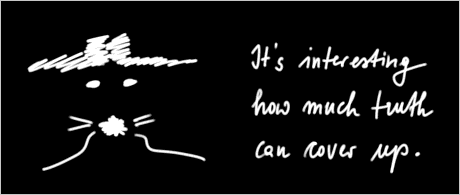Simplify simplification
May 18th, 2007A few days ago, I was skimming through thousands of pictures looking for eyes, preferably eyes of a strong tree out of a dream come true, but that’s another story. ![]() In my breaks, I did some day-to-day work like hopping over, actually scurrying over, to Dave Pollard (who we had already referred to) reading his daily blog on why we have not yet saved the world. So much for the history. Recently, Dave was asking for advice in seven words or less. His list, whether I like it or not, made me add our blogs starting credo Stop making sense to the list of comments and further advice. But only when I checked back I found the one advice (to love, to remember, to be and trust)
In my breaks, I did some day-to-day work like hopping over, actually scurrying over, to Dave Pollard (who we had already referred to) reading his daily blog on why we have not yet saved the world. So much for the history. Recently, Dave was asking for advice in seven words or less. His list, whether I like it or not, made me add our blogs starting credo Stop making sense to the list of comments and further advice. But only when I checked back I found the one advice (to love, to remember, to be and trust)
Breathe!
Added by Siona van Dijk. Or in my mother’s words: Schnaufn nid vagessn (Austrian dialect for “Don’t forget to breathe”). Thus, in a daring attempt to get the feel of an eyes’ glimpse of the air she is breathing, I scurried over to Siona’s profile where she writes
I trust uncertainty, don’t care for irony, and believe that paradox is a profound measure of truth.
— Siona van Dijk
Paradoxes only! Can you see the tree? On the path from trust to truth and back, the very grounds for liars to let trees flourish (trees with leaves of words) what more could we ask for? — Coffee! Of course, yes, but that’s again another story (though the same as above). — Simplification? — This is going to be complicated.
However, in the list of Siona’s bookmarks I found a link leading us to a list of Ten Commandments for a Simpler Way of Life (maybe we should make a list of lists, Juliet, please) where one can find (further) advices such as
II. You shall laugh on a daily basis.
VII. You shall turn off your technology.
VIII. You shall be spontaneous.
X. You shall learn what is ‘enough’.
— Ririan, 2007-04-05
An interesting list of commandments as only no liars could ever compile. A liar, though, cannot resist to add: For to lead a simple life You shall simplify simplification!
Sure, we “believe that all this could very well be wrong” (Siona van Dijk).
Having found the eyes, I’ll now go and look for roots.
But before I gonna move on, one more advice from yours truly rattus rattus: Answer for yourself what advice means to you.


